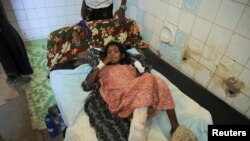The US charity official, who has seen the situation firsthand, said "Physical infrastructures need to be rebuilt...a lot of it was literally destroyed. I have seen pictures of healthcare facilities that were completely ripped apart, completely. Not only were things taken, but X-ray machines were smashed, all the equipment was taken, fridges are gone, the building is completely unusable."
Soeripto went on, saying "So physical infrastructures, rebuilding of school and healthcare facilities: absolutely number one priority."
She added "But then there's the stuff that is invisible... how do we make sure they get access to the mental health and psychosocial support they need?'
Addressing Tigray's needs, she said "I'm sure supplies are not completely fulfilled but in the cities you certainly see that resumption, which is good, but as I said, if 80 to 90 percent of the healthcare infrastructure and schools are damaged or completely destroyed, that is problematic."
Soeripto also said "The fact that teachers and doctors are still not paid prevents resumption of that kind of public service that I think we do need in order to really get back to normal, so to speak."
Among the challenges to be surmounted are the "long time to get the right level of medicine in that we need... we're very reliant on imports there."
Along with schools and hospitals, the charity official listed other pressing Tigray problems: "We don't have enough food, we're still hand-carrying cash into the region for our basic operations because the banking system hasn't been fully re-established, certainly not in the rural areas."
